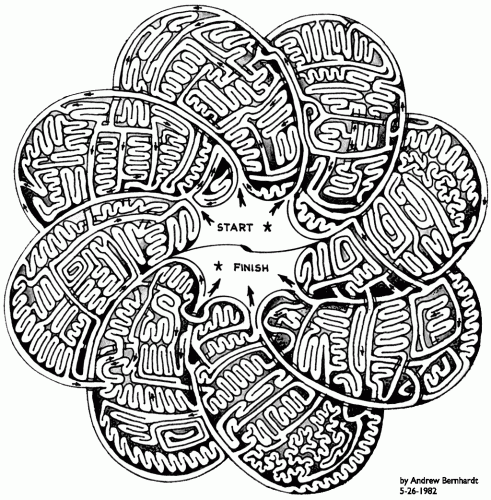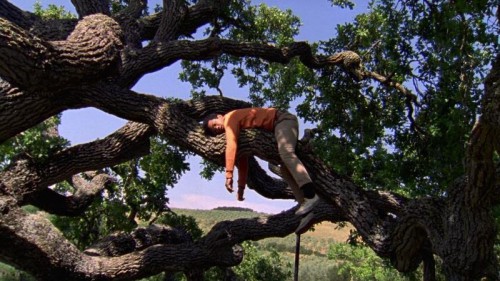
This is Part 1 of a multi-part series about college, faith, and the expectations of millennials from the perspective of two near-graduates: David and Lizzie, Mockingbird’s finest interns.
Emily Dickinson once wrote, “I have perfect confidence in God and his promises & yet I know not why, I feel the world holds a predominant place in my heart.” As students, David and I have often felt this same conflict; we have confidence in God—or, at least, confidence that we’ll eventually find [unwavering] confidence in God—and yet, uncertainty, a paralytic indecision that creeps in as we begin to consider “What’s next?” “What should I be doing?” “How will I find success?” “Should I even seek success? Stability? Fulfillment? Adventure?”
 The list of questions is endless. These queries—human, in many ways, but also incredibly relevant considering our positions as 22-year-old soon-to-be college graduates with no jobs and no real sense of “direction”—are consuming, and so, after trying to confide in God and then letting “the world” take its place in our hearts, we have gone beyond this divide to take it one step further, imagining ourselves at the base of an ever-branching path at which we stand, motionless.
The list of questions is endless. These queries—human, in many ways, but also incredibly relevant considering our positions as 22-year-old soon-to-be college graduates with no jobs and no real sense of “direction”—are consuming, and so, after trying to confide in God and then letting “the world” take its place in our hearts, we have gone beyond this divide to take it one step further, imagining ourselves at the base of an ever-branching path at which we stand, motionless.
To the left, ‘Career’ branches into the abyss (resembling more like 15 sub-paths), extending next to a trail labeled ‘Friends.’ There is one for ‘Family,’ one for ‘Romance,’ ones for ‘Location,’ ‘Social Life,’ ‘Hobbies’ and then more; infinite potentials that seem to appear with a slight of the imagination. We blend and then re-divide the lines in our heads, wondering which of these “roads” can and will overlap in the years to come. College was supposed to help us narrow it down, or at the very least, provide that first gust of wind, propelling us toward the ‘Next’ our “then-naïve” 18-year-old selves could not yet perceive. But here we are, 4 years later, and our “visions of the future” take on the qualities of a blinking cursor on a blank document.
People say that millennials are ego-centric. Individualistic. Deficient in attention span and deficient in responsibility. In many ways, these are not false summations. But we are also eager. Ambitious. And yes, I am writing collectively, because while I still acknowledge that every experience is unique (we are all snowflakes, after all!), there are certain subjects upon which nearly every “young 20-something” I’ve met has ruminated. Questions we’ve tried to answer for our parents, our advisors, and ourselves. David and I did our best to capture our thoughts on said subjects. First, we’ve decided to address the four-year phase from which we are only beginning to emerge, a growing pain of sorts: College.
Both of us–and every student, ever–has been asked the loaded question, time and time again, concerning our majors:
“What do you study? Why?”
David: I decided to study English because I thought there was something valuable in stories and language and communication and literary history that I wanted to tap into. Four years later, I don’t feel much closer to any inner sanctum of worldly wisdom, and it’s difficult to trust my original motivations. The idea that the great masters would have wisdom to impart to me sounds pretentious and that I would think it my privilege to go out and grab what they were peddling? Even worse!
Another underlying motivation was a desire to find work at something that would hopefully seem closer to play. But is that just a giant rationalization to shirk the inevitable fact of a job and the grind as long as possible? Was I basically too concerned with the periphery of life, the details that I thought and felt important, developing “taste,” and is that all impractical and foolhardy to devote time to? Self-
the periphery of life, the details that I thought and felt important, developing “taste,” and is that all impractical and foolhardy to devote time to? Self-
justification dominates this line of thinking. An excellent passage from Mockingbird’s Law and Gospel reminds me of the power of the Gospel to re-orient my thinking: “The pressure to self-justify has been removed, whether we believe it or not, and it has been replaced with freedom: the freedom to die and yet to live, to fail and yet succeed. The freedom to play, to serve, to love, to wait, to laugh, to cry, to sit idle–even to get busy.” Enough fretting, my friend, get busy!
Lizzie: I chose to ‘study’ (major in) Global Development Studies and English, so…I now know how to read (?). However, I’ve found that the more I read, the less I know. I chose GDS first, mainly because I felt an incessant urge to discover “a solution, any solution” to “a world problem, any world problem” (ha). Then I realized that this is undiscoverable, and I also recognized that some of the only things I’ve ever loved, always, were books; they also were among the few ‘things’ that have forever remained ‘enchanting.’ So I began pursuing the English track as well. Studying these subjects has only furthered my confusion concerning “the future”–as of now an ideal job would be teaching-meets-fiction-writing-meets-illustrating-meets-dabbling-in-diplomacy. I am more sociopolitically aware, maybe, and my vocabulary has grown, but college has presented me with an abundance of concepts and wisdoms often in conflict with one another. We are supposed to make conclusions, yet also recognize that no one really knows. Needless to say, I’m still staring at that blinking cursor.
A question that we often ask ourselves is how to value our social lives. The Weekend (up for a surprising number of Grammys, might I add) has become its own authority, to which we both submit frequently:
What is the meaning of leisure?
David: If the motivation behind my chosen course of study was to find something that truly fascinates me, I suppose it’s no wonder that I spent so much thought and energy dwelling in the weekend and social time because that’s when I truly felt the juices flowing, embarrassingly bad pun intended.
 Trying to investigate my emotions and motivations and develop more of an inner life, I picked up a number of books about young men around my life stage, written mostly by young men not too much older than their subjects. I found mostly confirmation of thoughts I’d already had and plenty of narcissism. Productive in learning about my self and my interests, maybe, but not helpful in inciting passions and bringing out my better qualities. Thus, the weeks are time for introspection guided by egotists and the weekend is time for the egotist himself to push any progress back into unconscious space and erase the days. Demonstrating a real concern for others or showing an interest beyond myself is not part of the equation.
Trying to investigate my emotions and motivations and develop more of an inner life, I picked up a number of books about young men around my life stage, written mostly by young men not too much older than their subjects. I found mostly confirmation of thoughts I’d already had and plenty of narcissism. Productive in learning about my self and my interests, maybe, but not helpful in inciting passions and bringing out my better qualities. Thus, the weeks are time for introspection guided by egotists and the weekend is time for the egotist himself to push any progress back into unconscious space and erase the days. Demonstrating a real concern for others or showing an interest beyond myself is not part of the equation.
Lizzie: Though I’m not proud to say it, it’s often difficult to combine my previously mentioned aspiration with a hangover. So when the weekend arrives, I often find myself at a sort of moral-cross roads. I—like every student I know—have spent my week (Monday-Thursday) ricocheting between class, work, and the library, often going pell-mell for every hour spanning between 8 am and midnight. Then Thursday night arrives, and suddenly: “freedom.” There is that hint of excitement for “what might happen,” somehow still compelling some 3.5 years later, and my mind switches gears. It’s almost instantaneous, an exchange of my hard-pressed ambitions throughout the week to follow the news, take a political stance, understand a poem, or to finally, finally decide on what I will be doing come next September for a secondary mode in which “fun” and “friends” are the only priorities and my modus operandi is rather unfortunately self-centered. “But I deserve this,” I’ll think, and ride on this thought for the following three days, laughing, stumbling, roaming, conversing, and seeking, above all else, contentment in the reverie. It’s almost bizarre, really, how immediately my ideals transform, but I suppose it’s a trade of one self-centered pursuit for another: Monday-Thursday, better my mind. Friday-Sunday, better my amusement. The gap between the two might be in ‘bettering my soul.’
A final question from others and ourselves:
What is the point of it all? [College, that is]:
David: Is the point to continue the climb? I hope not. I felt the treadmill of achievement exceedingly wearying in elementary and high school. The burden of never messing up and always push, push, pushing to take the toughest courses and earn the best grades. By the time I reached college it was time to exhale, I thought, and yet the people at school were not concerned with exhaling; they had the motor to continue on the treadmill. God bless them. The point really is the certification, though. Learning is important, but can be eschewed to the side in favor of other pursuits.
Lizzie: I am, I think, ready to leave college. I’m ready to enter a world where accountability means more and my own days should be spent doing something I find important, and hopefully, at the end of the day, somewhat beneficial to someone else, somewhere. However, as soon as I think this, I begin to ponder my faith.
What does it matter? Why am I so driven by the thought of achievement, renown, importance, intellectual prowess, visually and physically rendered ideas? Ultimately, shouldn’t my faith in—and with—God be enough? At this point in my life, I have to admit, it does not feel like it.
***
This mental upheaval seems far from unusual; from what I’ve read, discussed, and experienced personally, these same conflicts take precedence in the mind of any 20-something agent with anything even quite so resembling worldly “dreams.” It does, however, produce a bizarre sort of chasm, and if you’re caught with one foot on either side, the ever-widening gap reveals a deep abyss of identity-less, complacent ambiguity, or, as people my age might call it, a sort of death. This realization, in an odd way, is what I’ve come to think of as the “end re
sult of college.” Aside from the great friends and more refined social/professional skills, I think spending this much time with oneself allows one to recognize that I will never be the same as I was yesterday, but also, that is okay. We are trained to “find ourselves,” like David said, but college has taught me that instead of emerging from this period with a rigid form and set of beliefs that comprise “me,” I should instead exercise flexibility when tested, caution when necessary, and confidence when doubting. “We millennials” so value our individuality because the external world seems so inconsistent, but perhaps acknowledging our uncertainties and fears is the key to ascertaining any direction. We’ll probably never really “know,” but who does?
***
https://www.youtube.com/watch?v=9w1O7mu8Yog

COMMENTS
2 responses to “The Graduates (Almost): Thoughts on College, Leisure, and Uncertainty for ‘Millennials’”
Leave a Reply














Unsettlingly accurate, thank you!